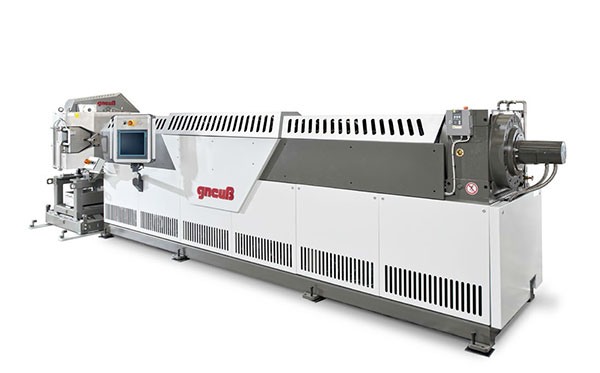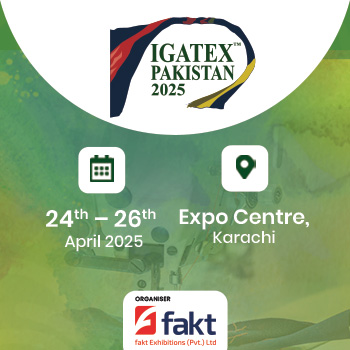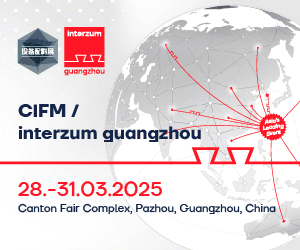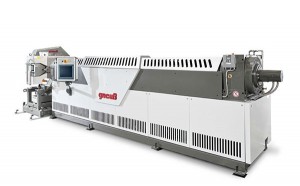 Over the last few years, Gneuss’ MRS extruder has established itself as one of the key technologies for processing of engineering polymers without pre-drying. Although originally developed specifically for PET, the MRS is now also running in polyolefin and nylon applications, and testing with other materials promises many more applications in the future. Even fiber coated with spin oils and other contaminants and with high residual moisture level can be fed directly into the extruder without any pre-treatment. Bicomponent (core / sheath etc.) staple fiber can for example be manufactured using the same input material and two different vacuum levels on two MRS extruders to deliver two melts with differing viscosities to the spinning beam. Thanks to the patented combination of single screw extruder with a multiple screw section, the extruder is very sturdy and particularly well suited for recycling applications. More than 50 MRS extruders of all sizes, from the MRS 35 for 35 kg/h to the MRS 200 for 2000 kg/h, are now successfully in operation worldwide. The extremely high devolatilizing and decontamination performance of this technology has been especially convincing. The MRS extruder permits the processing of PET without pre-drying by using a simple water ring vacuum system to process the material directly to high quality end products. This is achieved by means of its unique and patented processing section. Based on a conventional single screw extruder, the Multi Rotation Section is a drum containing eight satellite single screws, driven by a ring gear and pinion transmission. The “barrels” cut into the drum are approximately 30 % open and provide optimum exposure of the melt. Thanks to this design, the devolatilizing performance is approx. fifty (50!) times greater than that of a conventional single screw extruder – and this at a vacuum of only 25 to 40 mbar. By avoiding the need for a high vacuum system and pre-drying, the MRS is an economically efficient alternative to conventional technologies. Further arguments in its favor besides energy savings are the simple and rugged design, small footprint, its easy operation and maintenance, processing flexibility and last but not least its excellent melt quality and homogeneity. Strong and consistent growth in Gneuss’ business division Processing Technology as well as Gneuss’ transformation from an auxiliary equipment supplier to a system supplier has allowed the company to move forward with a sizable expansion of its manufacturing facilities in Bad Oeynhausen, Germany. This expansion will also ensure that there will always be ample space for further research and development.
Over the last few years, Gneuss’ MRS extruder has established itself as one of the key technologies for processing of engineering polymers without pre-drying. Although originally developed specifically for PET, the MRS is now also running in polyolefin and nylon applications, and testing with other materials promises many more applications in the future. Even fiber coated with spin oils and other contaminants and with high residual moisture level can be fed directly into the extruder without any pre-treatment. Bicomponent (core / sheath etc.) staple fiber can for example be manufactured using the same input material and two different vacuum levels on two MRS extruders to deliver two melts with differing viscosities to the spinning beam. Thanks to the patented combination of single screw extruder with a multiple screw section, the extruder is very sturdy and particularly well suited for recycling applications. More than 50 MRS extruders of all sizes, from the MRS 35 for 35 kg/h to the MRS 200 for 2000 kg/h, are now successfully in operation worldwide. The extremely high devolatilizing and decontamination performance of this technology has been especially convincing. The MRS extruder permits the processing of PET without pre-drying by using a simple water ring vacuum system to process the material directly to high quality end products. This is achieved by means of its unique and patented processing section. Based on a conventional single screw extruder, the Multi Rotation Section is a drum containing eight satellite single screws, driven by a ring gear and pinion transmission. The “barrels” cut into the drum are approximately 30 % open and provide optimum exposure of the melt. Thanks to this design, the devolatilizing performance is approx. fifty (50!) times greater than that of a conventional single screw extruder – and this at a vacuum of only 25 to 40 mbar. By avoiding the need for a high vacuum system and pre-drying, the MRS is an economically efficient alternative to conventional technologies. Further arguments in its favor besides energy savings are the simple and rugged design, small footprint, its easy operation and maintenance, processing flexibility and last but not least its excellent melt quality and homogeneity. Strong and consistent growth in Gneuss’ business division Processing Technology as well as Gneuss’ transformation from an auxiliary equipment supplier to a system supplier has allowed the company to move forward with a sizable expansion of its manufacturing facilities in Bad Oeynhausen, Germany. This expansion will also ensure that there will always be ample space for further research and development.
Gneuss filtration technology
With today`s economic pressures, the efficiency of a polymer melt filtration system plays an ever more important role. The Process Constant Melt Filtration Systems from Gneuss, particularly the RSFgenius and SFXmagnus with the unmatched efficiency of its self-cleaning back flushing system, economic efficiency and with regard to the achievable product quality set new standards in the industry. Worldwide a trend to bigger lines and therefore bigger filtration systems can be seen, so the number of RSFgenius and SFXmagnus systems sold in big sizes has doubled in the last years. The new RSFgenius M model can cope with even higher contamination rates thanks to the synchronization of the drive and back-flushing mechanism. This further optimizes the unique self-cleaning technology resulting in a significant increase of screen capacity as well as a reduction of the quantity of material lost through backflushing. RSFgenius M filtration systems are now running successfully in recycling applications. Rotary Melt Filtration Systems operate fully-automatically, continuous, process- and pressure constant. Gneuss introduced several other innovative new developments in their range of Rotary Filtration Systems in the last couple of years, all of which are now successfully in operation in a variety of applications.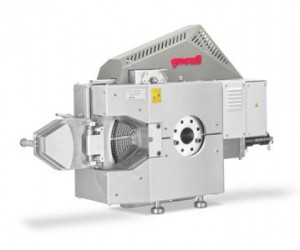
Gneuss measurement technology
On a MRS extrusion line, the melt viscosity can be measured in real time with the Online Viscometer, VIS. Using a precision spinning pump, a small polymer flow is pumped in bypass through a precision capillary. Both the melt temperature and the melt pressure are measured (at two points) and using internal calculation software, the system works out the representative shear rate and viscosity. When processing recycled PET with a varying residual moisture level and input quality, based on this melt viscosity measurement, it is possible to maintain the melt viscosity within a narrow tolerance band by changing the vacuum at the devolatilising section of the MRS extruder. With a control loop from the online viscometer VIS to the vacuum pump(s), the melt viscosity and therefore the IV of the end product can be maintained at the required level. While other manufacturers also offer online viscosity measurements Gneuss’ MRS extrusion technology is the only technology to measure and actively control the end product IV.

